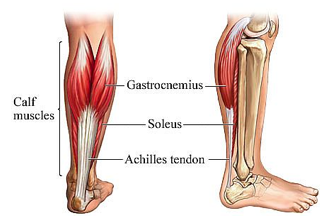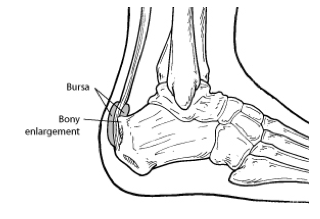


ACHILLES TENDONITIS/PARTIAL TEARS
As people age, tendons, like other tissues in the body, become less flexible, more rigid, and more susceptible to injury. Therefore, middle-age recreational athletes are most susceptible to Achilles tendonitis.
TREATMENT Nonsurgical treatment for Achilles tendon problems helps control symptoms. Surgery is usually not considered until it has become impossible to control the symptoms without it. Nonsurgical Treatment: 1) Nonsteroidal anti-inflammatory drugs (NSAIDs). NSAIDs, such as ketoprofen, ibuprofen (Advil, Motrin, others) and naproxen (Aleve), may ease pain and inflammation. 2) Initial treatments may also involve resting and protecting the sore tendon. This may require the need to immobilize your foot and lower leg in a short-leg walking boot for four weeks. This is followed by slow return to physical activity. 3) Next, physical therapy is used to strengthen the tendons. The therapist may use heat, ice, and ultrasound treatments to reduce pain and swelling. 4) In the foot and ankle, there is a risk that cortisone will cause a tendon to rupture, therefore, I do not recommend injecting cortisone/steroid into the Achilles tendon. However, a steroid injected into the retrocalcaneal bursa is safe. Surgical Management: 1) When nonsurgical treatments are unable to control pain, surgery may be required. To find out more information on Achilles Tendon problems from the Orthopaedic connection website of American Academy of Orthopaedic Surgeons.
|
|---|
 The Achilles tendon is the extension of the gastrocnemius, soleus and plantaris muscles that attaches to the heel bone (calcaneus). Achilles tendonitis is irritation and inflammation of this large tendon. Tendonitis can occur at the point where the Achilles tendon attaches to the heel bone or a couple inches above this site. Achilles tendonitis is a common overuse injury that tends to occur in middle-age recreational athletes. The overuse causes inflammation that can lead to pain and swelling. Furthermore, Achilles tendonitis can lead to small tears within the tendon, and make it susceptible to rupture.
The Achilles tendon is the extension of the gastrocnemius, soleus and plantaris muscles that attaches to the heel bone (calcaneus). Achilles tendonitis is irritation and inflammation of this large tendon. Tendonitis can occur at the point where the Achilles tendon attaches to the heel bone or a couple inches above this site. Achilles tendonitis is a common overuse injury that tends to occur in middle-age recreational athletes. The overuse causes inflammation that can lead to pain and swelling. Furthermore, Achilles tendonitis can lead to small tears within the tendon, and make it susceptible to rupture. Some patient may develop a Haglund’s deformity. This is a bony enlargement on the back of the heel that most often leads to painful bursitis, which is an inflammation of the bursa (a fluid-filled sac between the tendon and bone). This is termed Retrocalcaneal bursitis.
Some patient may develop a Haglund’s deformity. This is a bony enlargement on the back of the heel that most often leads to painful bursitis, which is an inflammation of the bursa (a fluid-filled sac between the tendon and bone). This is termed Retrocalcaneal bursitis.